Reporting and commentary by Councilperson Robert Lynch; August 5, 2024; Updated Aug. 10, 2024
Warning: Some of the graphic descriptions contained in this story may be unsuited for young readers. Parental discretion is advised.
We, the Enfield Town Board, are having a Dickens of a time updating our town’s Dog Law. What started out as a simple assignment last spring has devolved into something incredibly complex and lawyer-laden. And after our Board’s July 31st meeting, it’s become controversial as well.
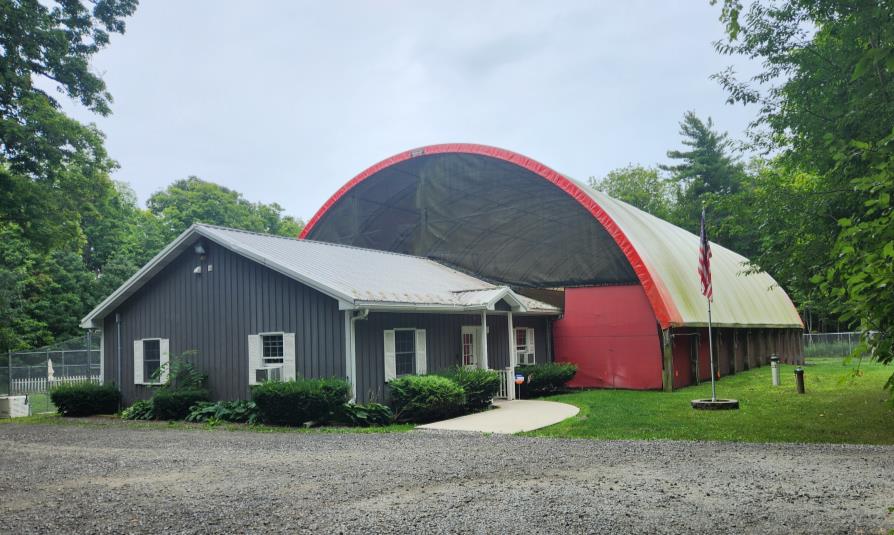
The Town of Enfield Dog Control Law was last revised in 2010; its fees increased in 2018. Since then, of course, inflation has crept up. At our April meeting, Town Clerk Mary Cornell suggested our Town impose late fees for dog licenses renewed more than 30 days late. She also suggested slight fee increases. A simple fix, we thought.
One month later, Clerk Cornell informed Board members they would need to call a Public Hearing to adjust the fees. In June, we held that first hearing.
But in the interim, Guy Krogh, the attorney for the Town, got a look at the existing, two-page Dog Law. He didn’t like it. Krogh said it hadn’t kept up with the times and with the evolution of New York’s canine control. The attorney offered a 16-page alternative, a document full of legal stipulations, detailed definitions, and what some might regard as regulatory surplussage.
The 2010 law had listed seven broad, prohibited acts by dogs and their owners. Most of those remaining sections stated their dictates in no more than a paragraph; sometimes a single sentence. Many of these sections dealt with fees and procedures. It was a law easy to read and to follow.
But lawyers get paid to keep towns out of trouble. So when Krogh forwarded Clerk Cornell his 8,700-word revised draft on June 12th, the same date as the Public Hearing, Board members turned their attention to what the attorney had written. Members implicitly cast aside the simple for the complex.
Since the new draft was nothing like the advertised document it replaced, the June Hearing served no purpose. We’d need a new hearing. Cornell suggested the Board schedule it for August, giving the Town Board the month of July to review the revised submission and to suggest changes.
That brings us to the July 31st Town Board meeting, and to where a dry-as-day-old-toast document suddenly took on new life.
What was expected to be the high point of the late-July meeting was the predicted sending to public referendum of local laws that would lengthen the future terms of three Town officers. The Dog Law review was supposed to be the meeting’s boring part. It was not.
All went routinely until the Board got to “Section 11.” It was a single paragraph—new language—buried in the document better than halfway through it. It dealt with owner liability for dog misconduct.
“If any domestic animal, farm animal, or companion animal is injured or killed as a result of being attacked, chased, or worried by any dog, the owner of said dog shall be liable to claims for such damages,” Section 11 began. It continued: “The owner of such injured or killed animal may make a complaint to the Animal Control Officer, who shall proceed pursuant to the dangerous dog rules of the [New York State Agriculture and Markets] Law….”
And that’s when—put most plainly—dog-lover and cat-fancier parted ways and divided the Town Board into fighting factions that produced a stand-off from which, at least in this writer’s opinion, the meeting never recovered.
“Oh, I actually want to strike that entire thing if it’s made to be like on my personal property,” Town Supervisor Stephanie Redmond interjected. “Because, I have a neighbor’s cat that comes onto my personal property, my dog is going to eat it… like and there’s nothing I’m going to do to stop it….”
“It won’t leave my property to go and find a cat,” Redmond said of her dog. “She’s just sitting on my porch all day long. But if a cat comes wandering in front of my porch, she will eat it.”
“I agree that if they’re on your property; but this sentence has to stay,” Councilperson Jude Lemke, our Board’s resident attorney, advised the Supervisor. “It just has to be, ‘provided, however, such domestic animal, farm animal, or companion animal has not wandered onto your property,’ or something like that.”
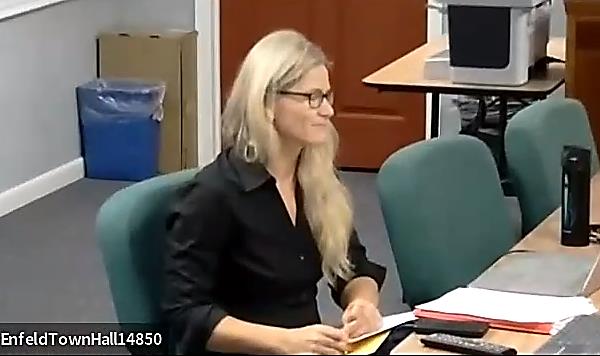
“I have a problem with making it that lenient, because…” this Councilperson, Robert Lynch, reacted. Before I could finish my sentence, Lemke continued.
“I can’t stop my dog from eating a cat that comes on my property,” Lemke admitted.
“Yeah, that happens all the time,” Redmond concurred. “The neighbor came. Oh, we won’t go there,” the Supervisor said with a sigh. Redmond never provided details. They would prove interesting to learn.
“Well, you’ve made my day!” this Councilperson, dead serious, told Redmond. I found no sympathy, nor concurrence, but rather muffled laughter heard from others at the table.
“You gotta’ control your animals,” Redmond replied to this cat owner.
“I know. I know,” I said. “But cats do wander. Take it from somebody who’s been through that. My cats are confined now. But they didn’t used to be. And I—I do worry. In my neighborhood there are dogs that attack and kill cats. And I don’t like it.”
Over the years, before Enfield’s forest dangers of known or unknown origin prompted this pet lover to confine the confine-resistant felines in his family, my Midnight calls to summon home twin felines Juliet and Angel were legend on Gray Road. I never lost either of them to a predator. But I‘ve lost other cats both before and after.
Councilperson Cassandra Hinkle related her own personal, unintended tragedy:
“We have a six-foot fence on our property that has one gate, that both of our dogs stay in,” Hinkle said. “A neighbor’s cat ended up in the property somewhere. I don’t know where they were. But the dog went into there. I closed the gate. Fifteen minutes later, there’s a ruckus, and my neighbor’s cat is deceased. And that’s not the thing that was planned. The gate was closed. It’s just a fence. What more could I have done?”
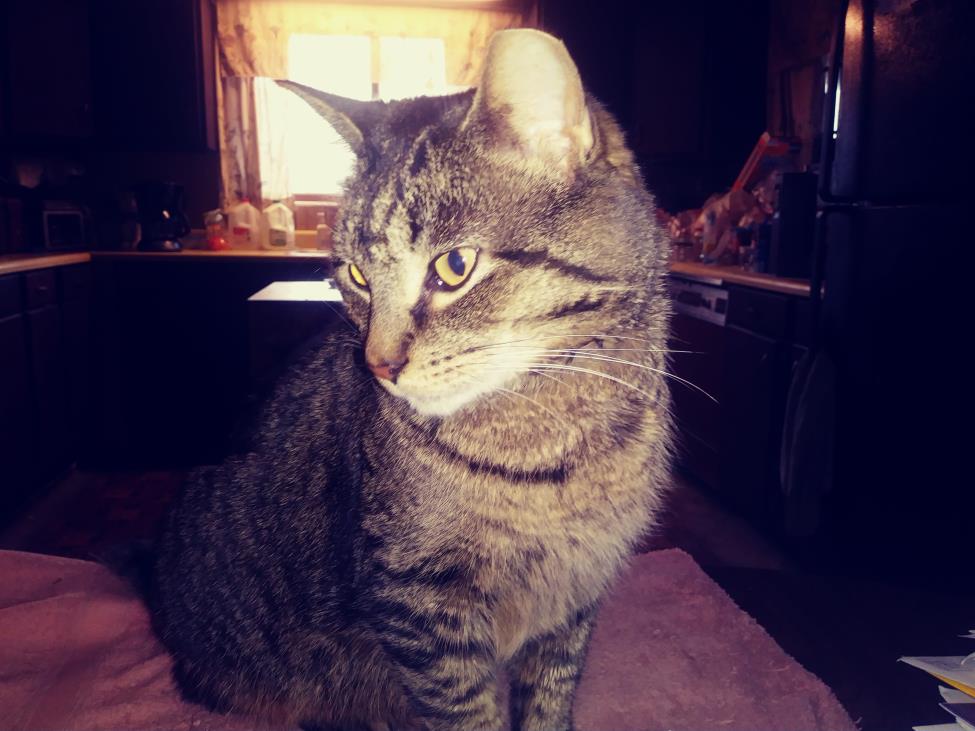
Yes, accidents like Hinkle’s sometimes happen. Credit that Councilperson for at least attempting control and confinement with her fence. Supervisor Redmond, at least by most people’s definition, views confinement differently. Redmond says her dog (somehow) recognizes lot lines, stays within them, and within those boundaries is allowed to run free.
“There’s no way I’m ever going to stop my dog from eating a cat,” Redmond told our meeting. “I couldn’t. There’s no possible way for me.”
“I try,” Councilperson Lemke replied, Lemke acknowledging she faces a similar challenge.
“My dog has never been around cats, except the cats that come in the yard that they chase and go after,” Lemke said. “They’re the only cats they ever see. So how am I supposed to teach my dog that that animal is somehow different from all the other animals that come on our property?”
“Maybe now that as she’s getting older, I could get her back,” Redmond said of her own dog. She followed her statement with more impromptu giggling.
“Then if you know that your dog has a propensity to kill other domestic pets that wander onto your property, you probably should confine your dog,” I answered with dead seriousness.
“I do. To my property,” Redmond replied, with a defensive chuckle.
“To your property? Or do you confine him or her to a pen?” I rebutted.
“No.”
“Or to a run?”
“No,” Redmond said. “Because she’s going to sit there on my porch and we watch everything. And if something comes over the lot line, she’s going to eat it.”
“With all due respect, that’s irresponsible,” I stated solemnly, firmly.
“I do not think it’s irresponsible,” Redmond insisted. “She’s not leaving my property.”
“If you know you’ve got a predatory dog…” I began my thought.
“Oh, no; it’s not predatory,” the Supervisor interrupted.
“[If] you’ve got a predatory dog, then you should control,” I restated my point with emphasis.
“It is controlled. It’s right on my property all the time,” the Supervisor defended herself. “It sits on my porch, and it doesn’t go more than 100 feet away from my front door. She’s old. But if a varmint comes walking by, she’s all of a sudden becoming [unintelligible from the audio transcript].
The exchange, quite obviously, went nowhere. And after about ten minutes, the Town Board moved on to other sections of the proposed Dog Law. But before we did, Town Clerk Mary Cornell, with whose licensing oversight canine control belongs, offered an observation:
“If there’s no fences that you can see, and the animal or a person is being chased onto somebody else’s property, that’s a little different,” Cornell stated to push back a bit on the Supervisor’s hardline position. “They’re (that is, the intruding dogs or cats are) not entering that property willingly. So I think there’s a little vagueness in here too for what you’re saying, versus, you know: An aggressive dog is chasing a kid, and that dog is trying to protect your kid and they end up on your property, and they get attacked anyway.”
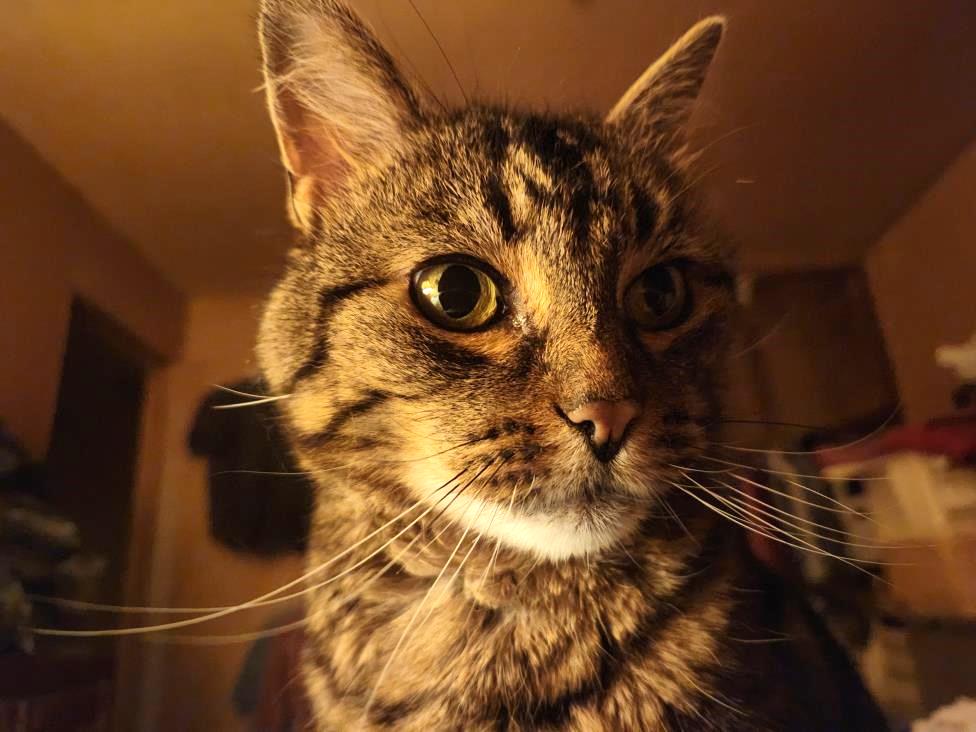
“This is not an attack on a kid. This is an attack on an animal,” Councilperson Lemke reminded the Town Clerk. “There’s no way that I could control my dog. You think a cat is a cute little thing. My dog has not seen a cat. They’re not around cats.”
“They’re food,” Redmond chimed in for anyone with the stomach to keep listening.
“How am I supposed to train them that a cat is different?” Lemke asked.
“Keep them under your control,” I offered with a pointed, ready answer.
“Well, if my mouse runs onto your property, and your cat eats it, I want you to train your cat so it doesn’t eat that mouse, because it was my mouse,” Redmond reacted with a whine, our Town Supervisor offering us logic that’s bound to escape the reasoning of anyone beyond the age of five.
Clerk Cornell will seek attorney Krogh’s interpretation as to whether the Town Board can carve out an exception to owner liability for animal attacks by one’s own dog on one’s own land. And if the exception complies with state law, the Town Board’s majority will likely embrace it at a later meeting.
****
[Observation: As Councilperson, I must obey the dictates of Enfield’s 2017 Civility Resolution, as I expand its reach beyond that of our public meetings. I must also honor consultant Ronald Mendrick’s recommendations on public officer propriety, advice that our Town Board endorsed and paid-for dearly with your taxpayer dollars three years ago. Accordingly, I will restrain my words here and at least at the moment and for the sake of civility assign the comments of Supervisor Stephanie Redmond the degree of respect they should receive as those of our Town’s chief elected administrative officer.
That said, I am deeply troubled by those remarks. I question the callous, flippant, uncompassionate treatment of animal predation that our Supervisor had expressed during her public comments of July 31, as I likewise do her dismissive neglect of common human sensibilities. I find equally disturbing the casual, lighthearted acquiescence of the Supervisor’s opinions given by some of her colleagues on our Town Board. Their acceptance provides express or tacit endorsement of what the Supervisor had said. We deserve better; a wiser, more critical group of thinkers.
The Enfield I know is a community of neighbors. We are a place where neighbors care about their neighbors, including about their pets. The cat that the Supervisor so willingly and casually acknowledges her uncontrolled dog routinely devours, if only on her property, could be a young child’s cherished friend, or an older adult’s lone companion. It could be an otherwise-conscientious resident’s confined housecat that somehow slipped through an unlatched door or a torn screen. And as our Town Clerk, Mary Cornell, pointedly referenced during our discussion, it could have been a pet chased onto the Supervisor’s property by a predator from someplace else.
Accidents happen, of course. Animals die by chance, just as people do. In Councilperson Hinkle’s own admitted case, the Animal Control Officer or the Town Justice—as well as, one would hope, the deceased cat’s owner—should in such an instance demonstrate compassion and understanding, forgive Hinkle for the tragic incident, and waive any penalties otherwise imposed.
But reckless, irresponsible pet ownership constitutes behavior of a different sort. What Supervisor Redmond—and to a large extent, other Town Board members—have defended here is a perverse, twisted misinterpretation of the “Castle Doctrine,” a construction that uses the metes and bounds of one’s property line to circumscribe a personal fortress. It sets a boundary within which no other person or pet may venture under penalty of death.
If Supervisor Redmond’s own standard of human liberty and permissible animal conduct has truly become the new norm within Enfield, it has made ours a community I do not know and one in which I hold no desire to involve myself further within its Town Government. Nor, for that matter, should I live here.]
****
There’s more to Enfield’s revised Dog Law, besides the liability issue and a slight uptick in fees.
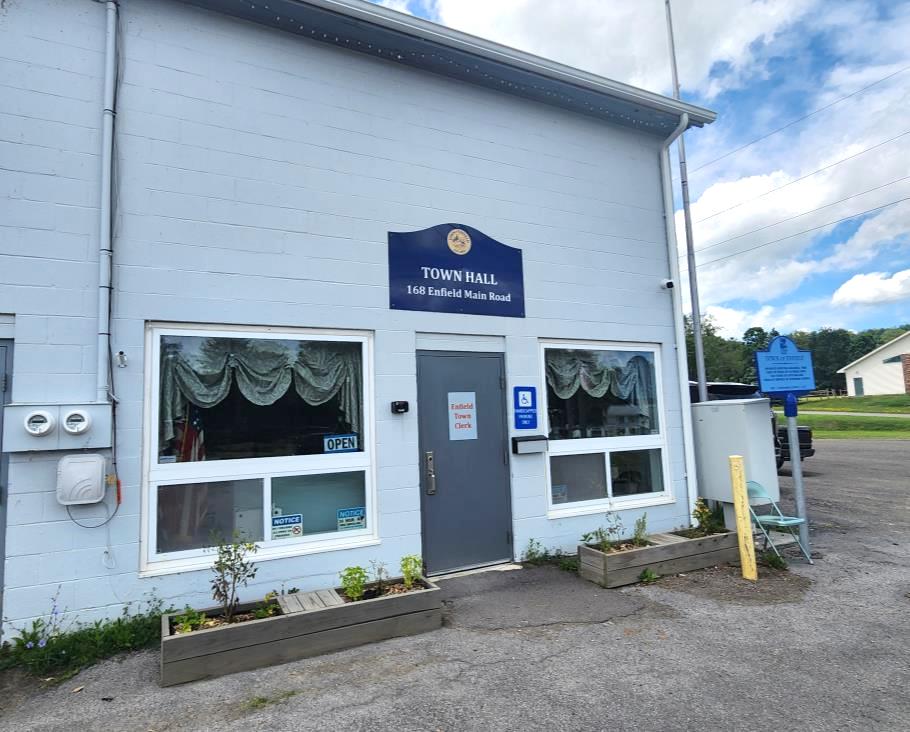
Most notably, any residence with five or more dogs would now carry the designation as a “kennel,” to which certain requirements would attach. For kennels, all animal food would need to be kept in sealed containers, and all animal waste removed daily.
Female dogs would need to be confined when in heat. Leashing requirements when a dog is not on its owner’s property remain under Town Board review.
The Board will likely continue its study of the revised Dog Law at its August 14th meeting. A second Public Hearing could come as soon as September.
****
Update; Aug. 10, 2024: At the request of Town Supervisor Stephanie Redmond, and in relation to the issue of Owner Liability, Guy Krogh, Attorney for the Town of Enfield, wrote Redmond August 5th that her and other Board members’ concerns about the reach of the liability provision could be addressed by stipulating in the proposed Dog Law that the Board could provide that as “an affirmative defense to any such charges or liability that the dog was at the time of the incident upon the dog owner’s property.”
Expect the liability issue to be addressed again when the Town Board reconvenes August 14. / RL
###

